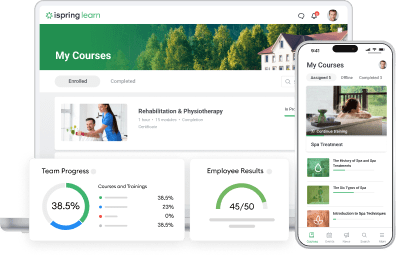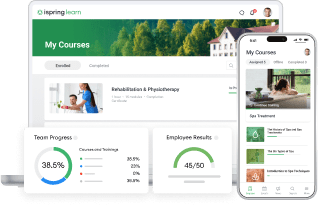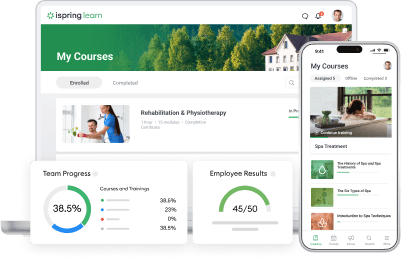The 20 Best Learning Experience Platforms (LXPs)

In recent years, a new type of eLearning platform has begun to play an increasingly prominent role: a learning experience platform (LXP). This platform places learners and their needs front and center, creating highly personalized learning experiences that are more engaging and enjoyable, ultimately increasing course completion rates. This helps companies upskill and reskill the workforce more efficiently while reducing churn rates.
In this article, we review a selection of the best learning experience platforms to help you take employee training at your organization to the next level. Plus, you’ll find comprehensive guidelines on choosing the best platform and which key features to look for.
What Is an LXP?
A learning experience platform (LXP) is cutting-edge software for employee training and development, with a strong focus on advanced personalization and engagement features.
The key difference between LXP and LMS is that an LXP is learner-driven at its core, whereas a traditional LMS is admin-focused. In the following chart, we have summed up the key differences between LXP and LMS features to provide a quick overview.
LXP vs. LMS Comparison Chart
| Aspect | LXP | LMS |
| Main focus | Personalized learning experiences | Formal, standardized training |
| Learning approach | Top-down, mainly instructor-led | Bottom-up, mainly learner-driven |
| Content sources and delivery | Learning content is pulled in from various sources and delivered using a variety of engaging formats | Learning content is mainly provided by the company and delivered in a more formal, structured way |
| Social learning and collaboration | Robust social learning and collaboration features aimed at improving engagement and boosting motivation | Social learning and collaboration options are often limited |
| End goals of learning | Closing skills gaps, addressing personal training needs, fostering continuous learning and career development | Closing skills gaps, addressing organizational training needs, ensuring compliance |
That said, research shows that the differences between various learning platform types are blurry.
For this reason, some platforms that might be better known as LMSs are also featured on the following list of the 20 best LXPs.
The Top 20 LXPs on the Market
Now, let’s inspect some of the most popular learning experience platforms for company training available on the market to help you narrow down the options and find the best fit for your business.
1. iSpring Learn
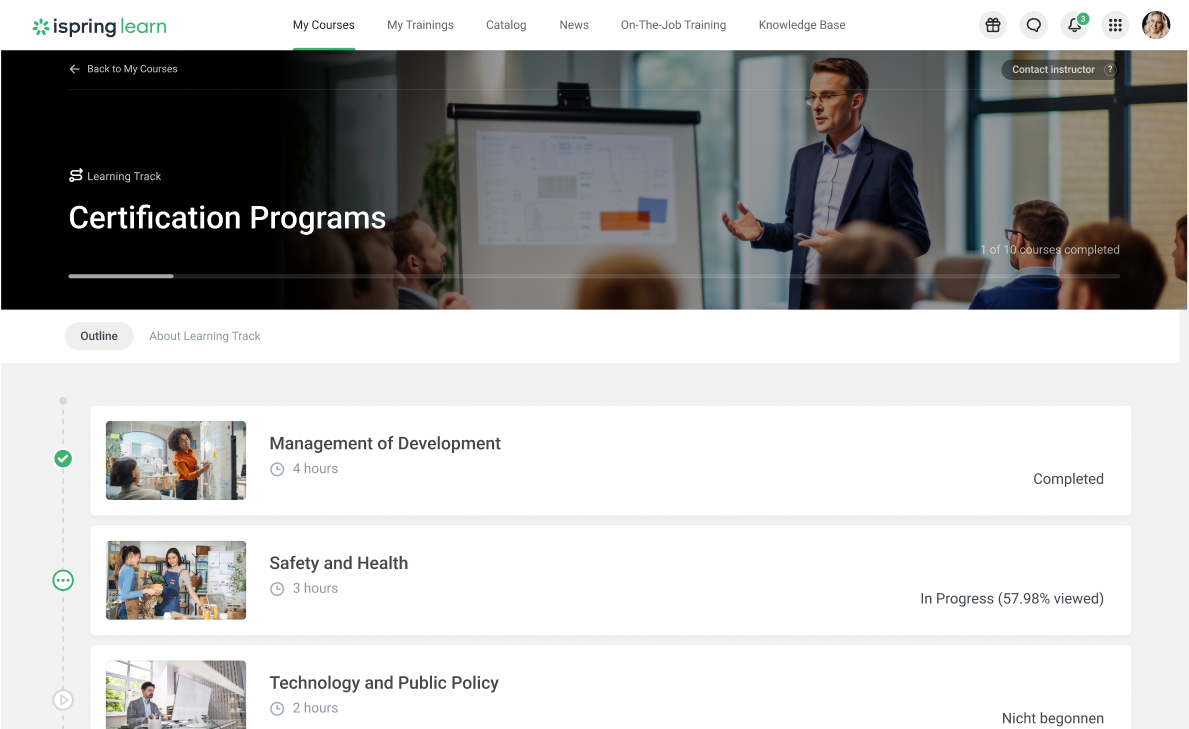
iSpring Learn has long been regarded as a top LMS that can cater to a wide variety of corporate needs. But it also offers a range of LXP features that allow it to combine the best of both worlds without sacrificing key functionality.
Thus, you can rely on iSpring Learn to carry out standardized procedures, such as employee onboarding and compliance training, while also using it to provide engaging learning experiences that are more typical of LXPs. These include personalized learning paths, gamification and awards, social learning and collaboration features, skills analysis, and pulse surveys.
As an added plus, you can try iSpring Learn for free, even without providing any payment details, and decide whether it’s a good fit for your company.
Pricing: Tiered flexible pricing plans start at $4.70 USD per month per active user.
2. Cornerstone Learning
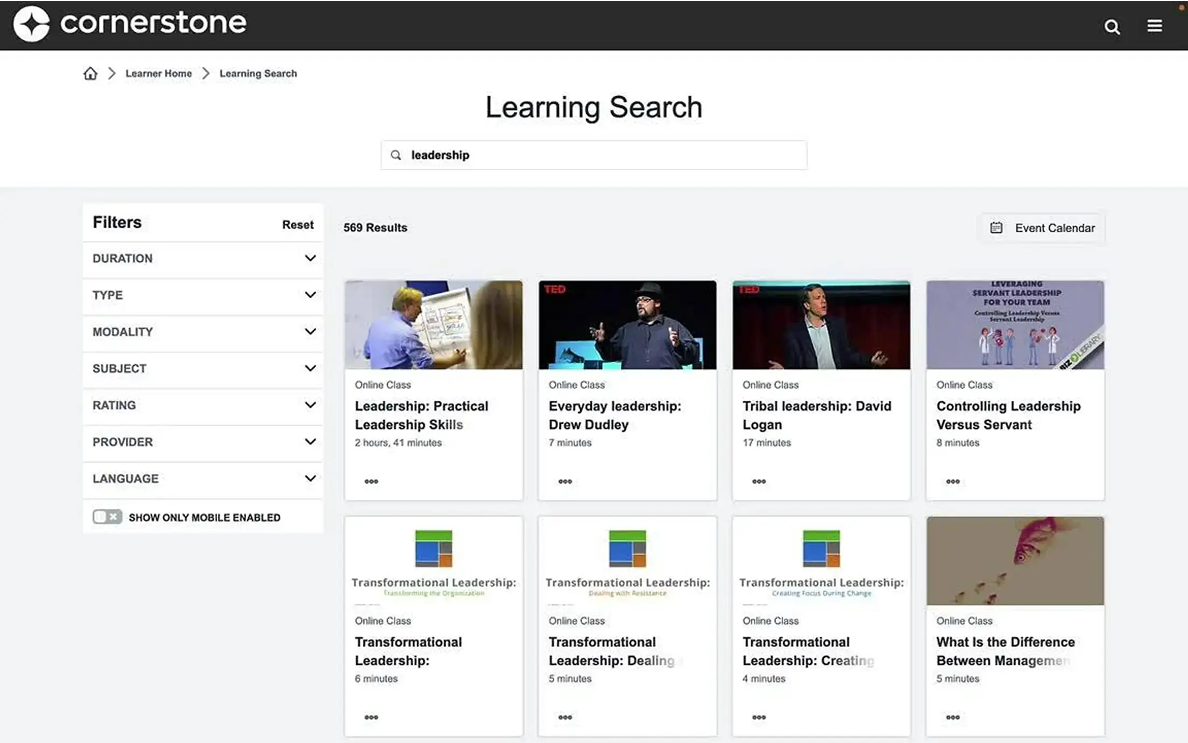
Like many modern educational platforms, Cornerstone is a combination of an LMS and an LXP. As an LXP, it mainly focuses on building adaptive learning paths and individual learning plans based on skills assessment and AI recommendations.
The platform enables companies to align employee training and development with business goals through advanced reporting, analytics, and easy learner progress tracking. Moreover, Cornerstone features a rich content library with expertly curated courses, communities, collaborative learning features, and numerous integrations.
The user interface, however, might be an issue, according to customer reviews. Other possible cons include integration issues and a steep learning curve.
Pricing: Available upon request, no free trial period.
3. Docebo
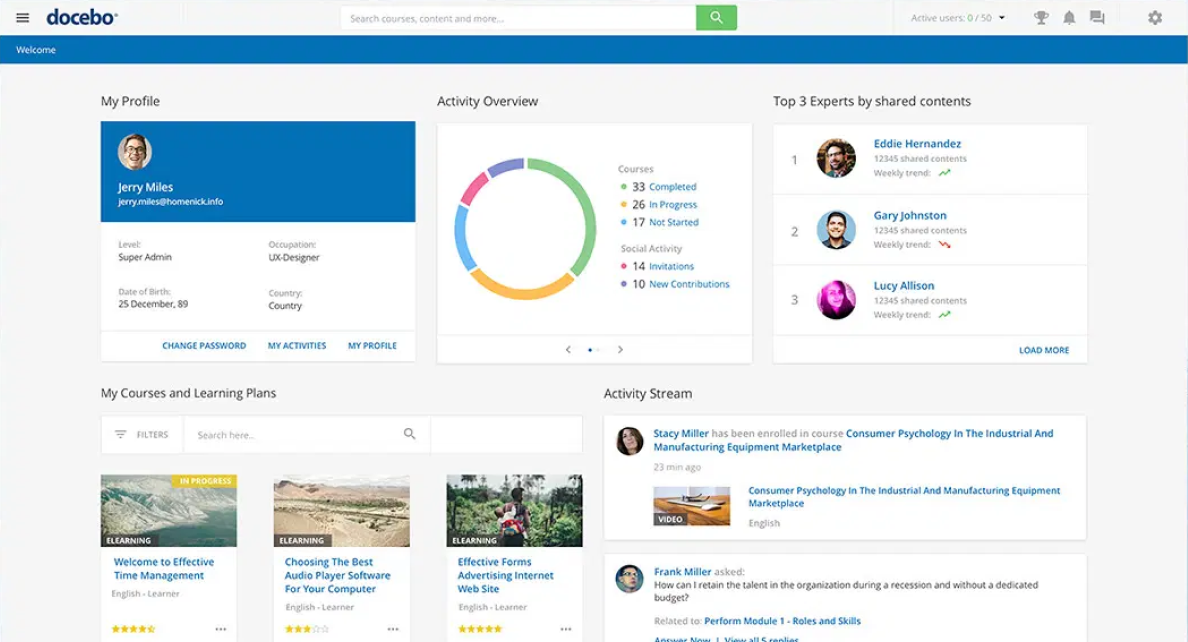
Marketed as an eLearning solution for big enterprises, Docebo is primarily known as an LMS. But it is also one of the best AI-powered learning experience platforms on the market. Docebo’s robust AI features facilitate content creation, power advanced analytics, curate content, provide personalized assistance to learners, and more.
The platform also allows for extensive customization, offers advanced user management capabilities, and provides tools for effective communication and collaboration. Another highlight is numerous integrations that allow you to expand the platform’s functionality even further.
However, some find Docebo’s features overabundant and its learning curve too steep, which can make adopting the platform troublesome.
Pricing: Available upon request, no free trial.
4. Microsoft Viva Learning
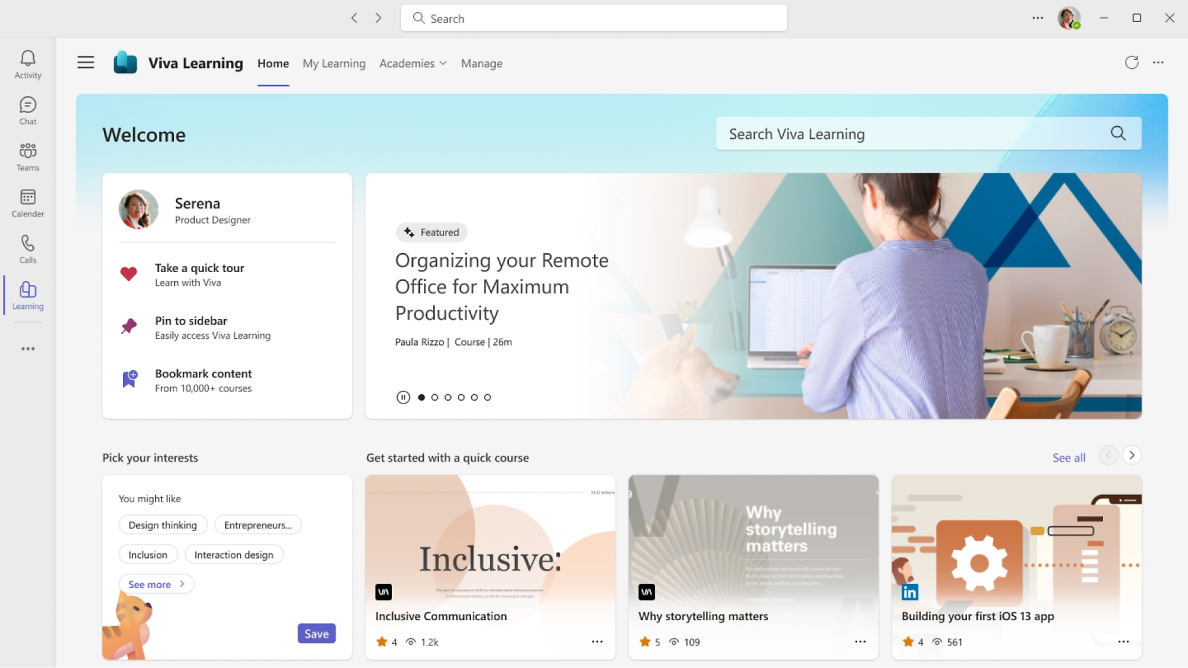
Being part of the Microsoft ecosystem, Microsoft Viva Learning is particularly attractive to those who value native seamless integrations with other Microsoft products, such as the MS Office Suite and Copilot AI.
As an LXP, the system offers an array of features, such as learning paths, AI learning content suggestions and its aggregation from various providers, tools for enabling collaborations and discussions, and more. The platform also provides engagement and learning adoption reports and allows for the creation of so-called academies with curated content on different topics.
Since the product was only launched recently, reviews are scarce, and adopting it might be a bit more challenging because of a lack of information on possible issues.
Pricing: Tiered pricing plans start at $2.00 USD per user per month.
5. 360Learning
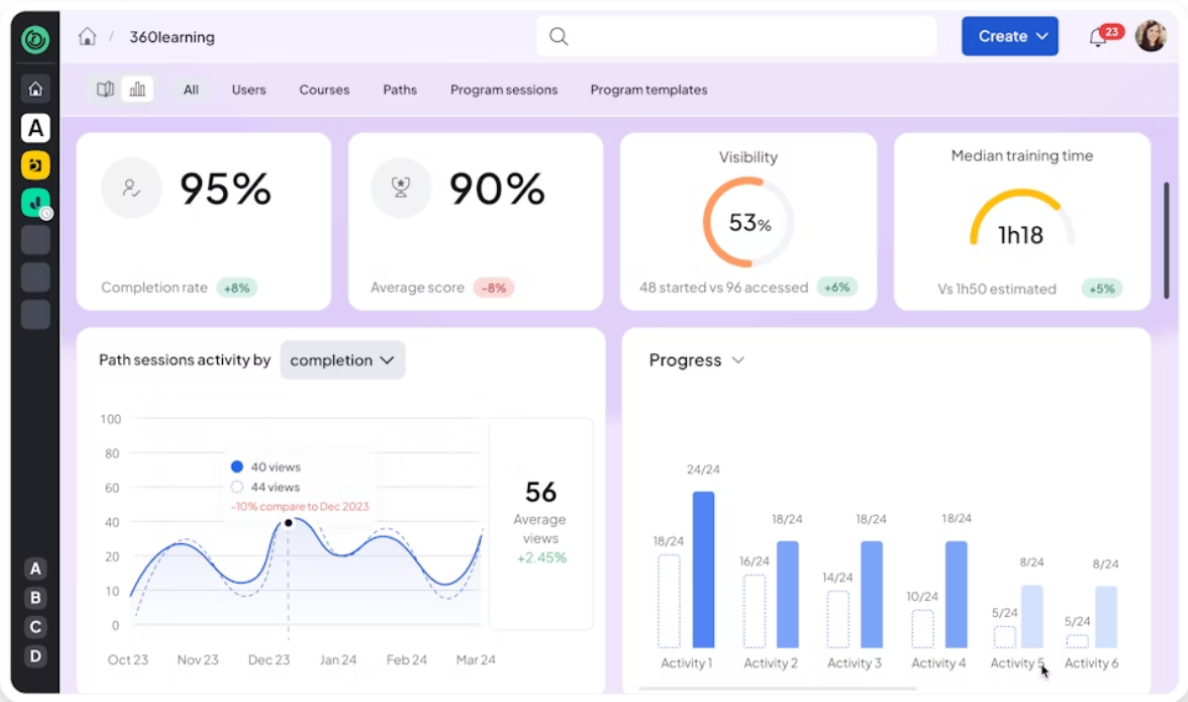
360Learning is a well-rounded eLearning solution that can cater to various industries and needs, thanks to its versatility. Often mentioned on best LMS lists, it is an LXP first and foremost, since it is learner-centric at its core.
Its main highlights include a collaborative course creation tool, individual learning tracks and course recommendations, user-generated content, and social learning features. The platform also allows for creating dedicated “collaborative academies” with curated content and extensive capabilities for skill-based learning.
But the platform also has somewhat complex navigation, according to some reviews. Companies that need more LMS functionality might also find some features lacking.
Pricing: Tiered pricing plans start at $8.00 USD per registered user per month.
6. Adobe Learning Manager
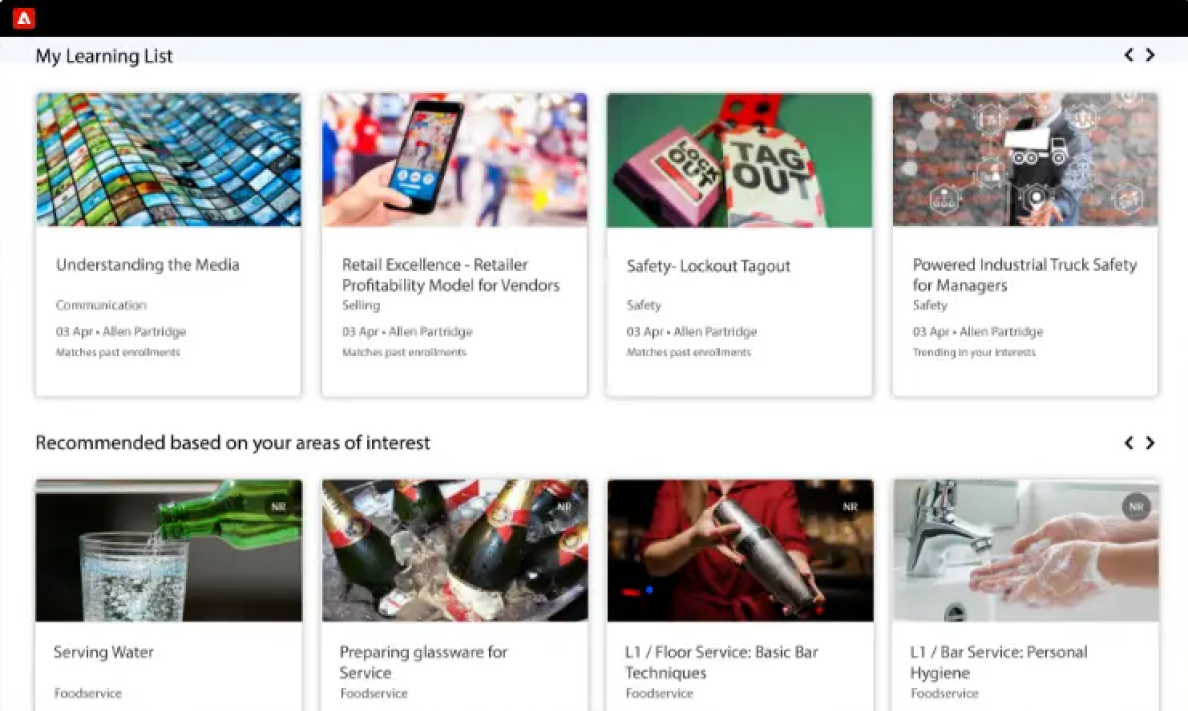
Adobe Learning Manager is another LMS that has evolved to incorporate essential features to enhance the learning experience. The highlights of this system include quick and easy content creation with Adobe tools, robust analytics features, and personalized learning.
The platform features a wealth of ready-made online courses in its marketplace, AI-driven content recommendations for creating tailored learning journeys, and gamification and engagement features. AI- and machine learning (ML)-curated groups and discussion forums promote social learning.
As drawbacks go, user reviews mention the platform’s complexity, not enough user-friendliness, occasional reliability issues, and somewhat high costs.
Pricing: Three pricing plans, details available upon request. A free trial is available.
7. D2L for Business
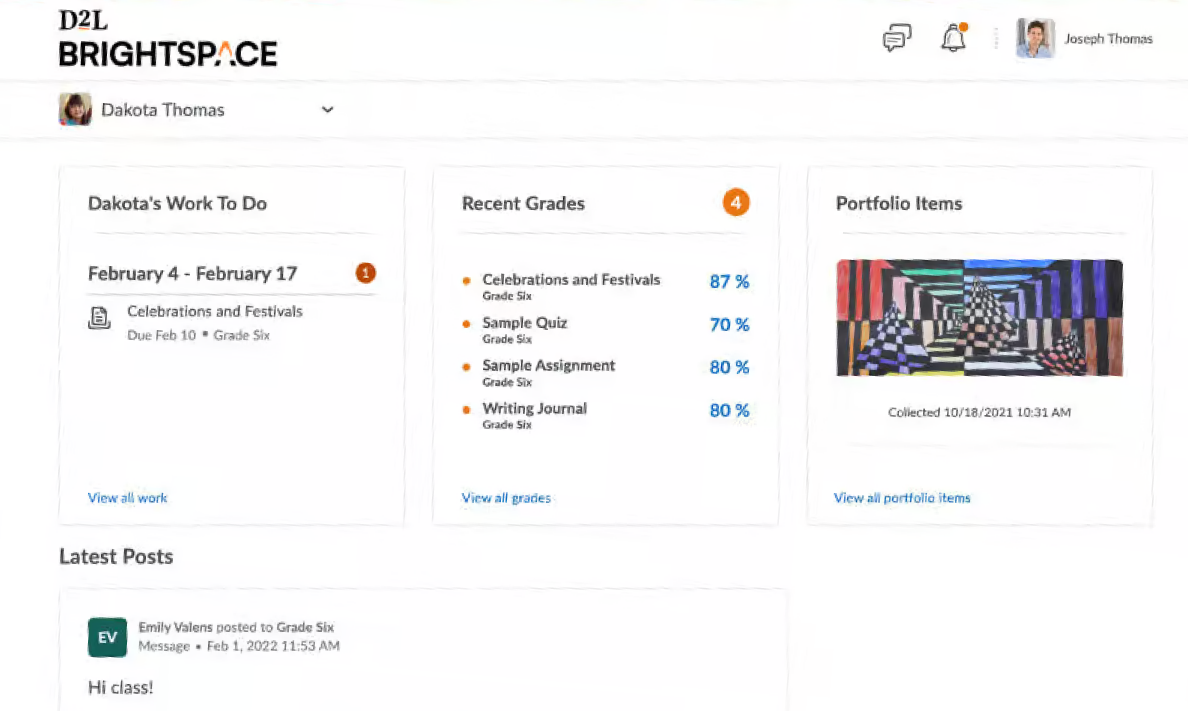
D2L is well-respected in the educational industry for its D2L Brightspace eLearning platform, which is mainly popular as one of the top LMSs for higher education institutions. However, the vendor also has a solution for corporate training and employee training and development called D2L for Business.
This platform combines the capabilities of an LMS and an LXP, offering tools for AI-assisted course creation, skills assessment, building career pathways, reporting, and more. It also features a library with ready-made online courses and enables integrations with third-party tools.
On the downside, some users consider the platform’s interface rather confusing, which undermines user experience. Mentions of issues with navigation and customization appear in customer reviews as well.
Pricing: Available upon request, no free trial.
8. LearnUpon
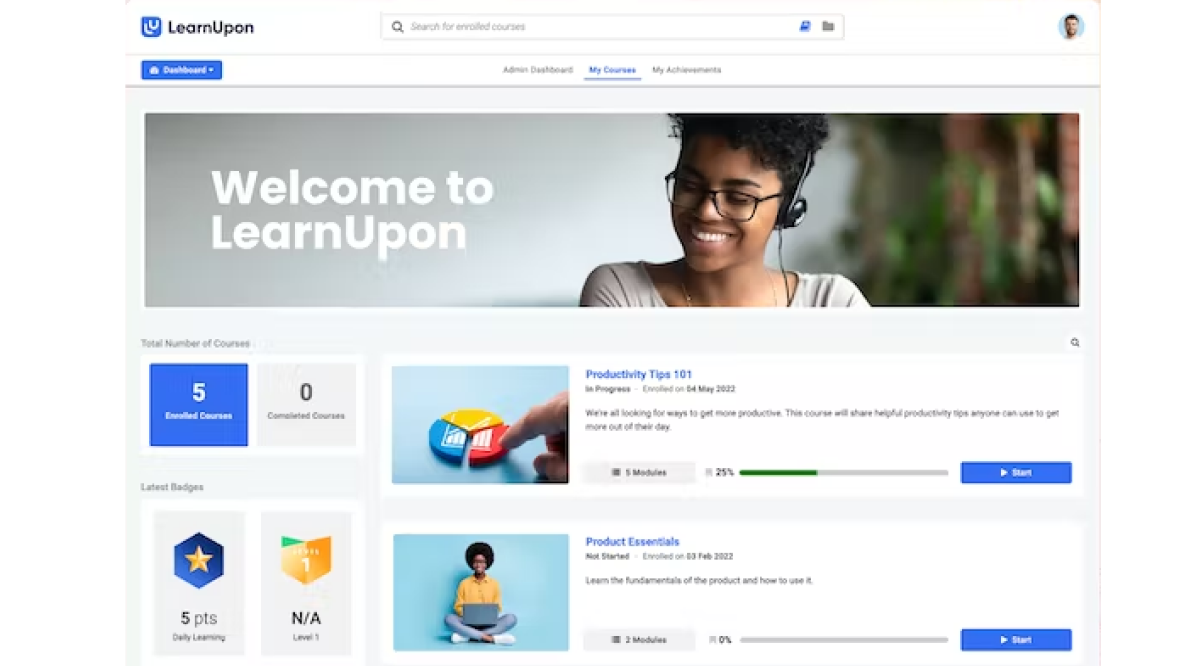
LearnUpon is another popular enterprise-level LMS that has evolved to incorporate a lot of typical features for LXPs.
These include extensive AI-driven functionality, including AI-powered course building and assessment task creation, personalized learning paths, automated learning content recommendations, gamification and engagement features, and customizable learning portals. Admins can also combine different approaches to course enrollments, allowing employees to either discover courses on their own or enroll them in mandatory programs.
That said, reviews indicate that the platform’s reporting and analytics options might be somewhat underwhelming.
Pricing: Tiered pricing, details available upon request. No free trial.
9. Absorb LMS
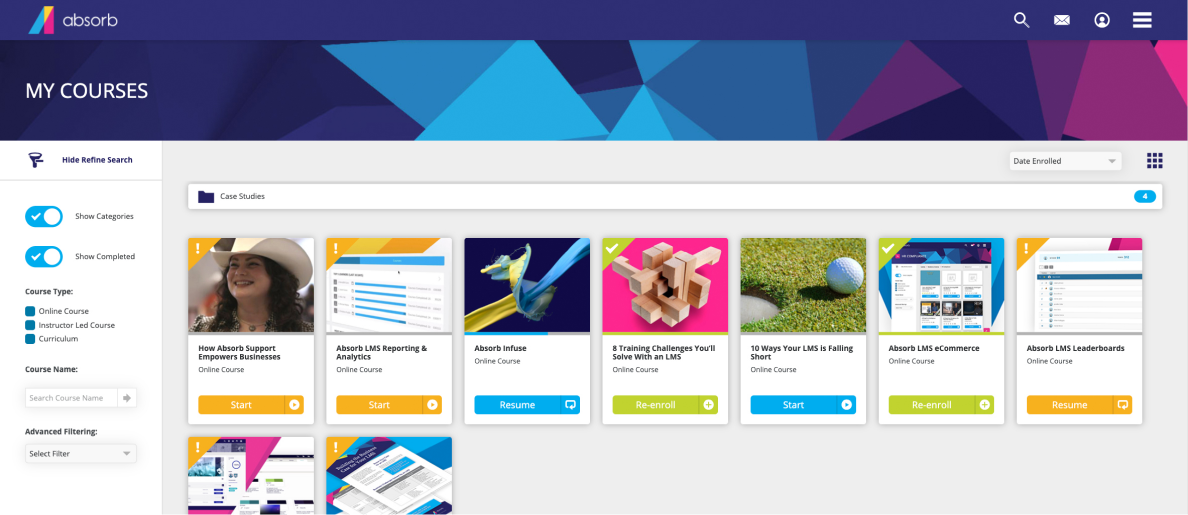
Absorb is a popular corporate training solution that is mainly an LMS, but with a variety of solid LXP features. Its main strong points include an attractive-looking, user-friendly interface, an AI-powered native authoring tool, extensive engagement and gamification features, and more.
Moreover, the platform features a built-in library of training programs and offers AI-assisted personalized upskilling, admin support, and smart recommendations that enable adaptive learning. The platform also offers Absorb Engage — a tool set for collaborative learning that features billboards, forums, leaderboards, and more.
Yet some reviewers find the platform’s reporting features disappointing. A somewhat limited functionality is also frequently cited as a drawback.
Pricing: Available upon request, no free trial.
10. Litmos
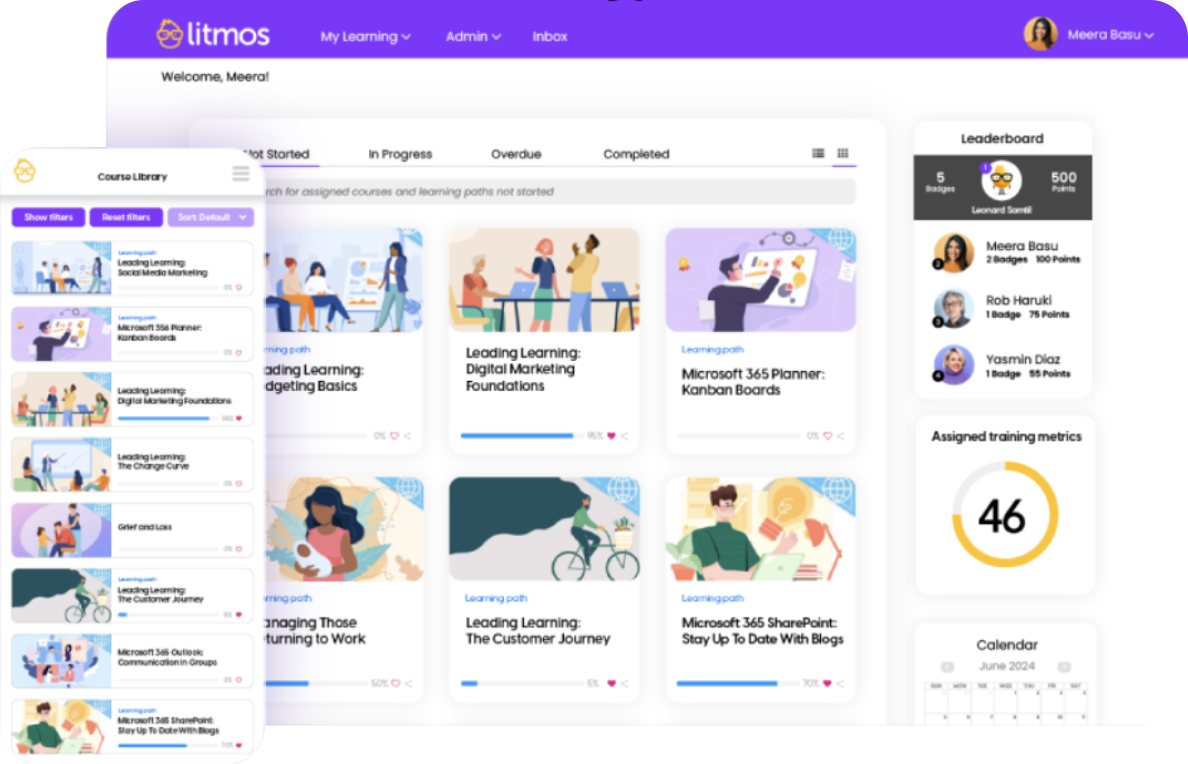
Litmos is a well-established online learning solution widely used in mid- to large-sized organizations that need to combine the solid structure of LMS-based learning with the benefits of an LXP.
Besides its core LMS features allowing standardized corporate training, the system offers a wide array of AI-driven features to aid course building, knowledge assessment, feedback, and social learning. Plus, there is a built-in training content library with ready-made learning tracks and a good selection of native integrations.
Among the drawbacks mentioned by users, reporting issues are the most common. Other complaints include missing or limited features.
Pricing: Tiered pricing plans, details available upon request.
11. Degreed
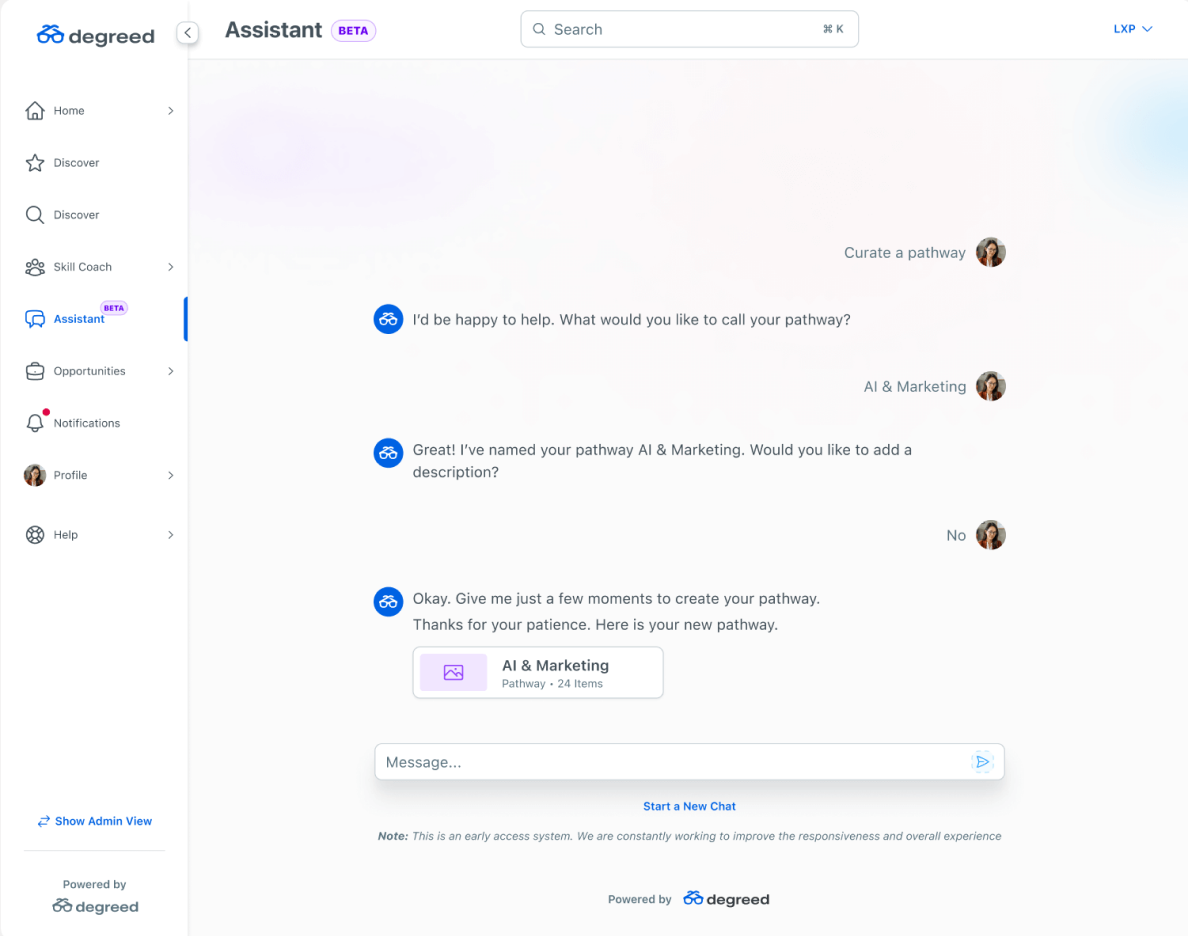
Degreed is a learning experience platform that prioritizes skills development and shines at building personalized learning pathways around specific skills and skill sets. Among its key features are AI-powered content curation and detailed skills reporting that permits evaluating workforce competencies and identifying skills gaps.
Other capabilities of this LXP include tools for collaboration and communication, as well as gamification and engagement features. To add more features, you can integrate Degreed with other platforms in your ecosystem through API.
However, as a true LXP, the platform might seem lacking in some features that LMS users value. Also, reviewers mention some issues with integrations and reporting.
Pricing: Tiered pricing plans, details available upon request. No free trial.
12. Juno Journey
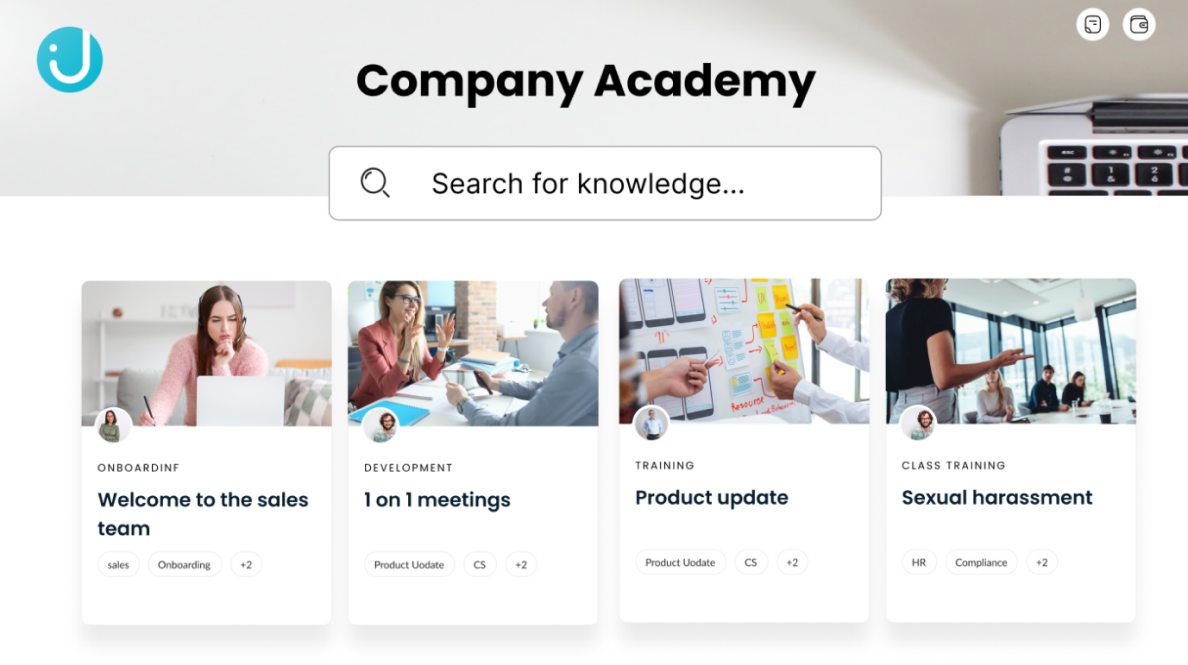
Juno Journey is both an LMS and an LXP and is marketed as a holistic eLearning solution to cover all training and development needs. Primarily aimed at mid-sized and larger organizations, it provides all the essential functionality of an LMS plus core LXP features for boosting learner engagement.
Some of Juno’s strongest points include a variety of curated content, AI course recommendations, the ability to create comprehensive learning journeys, easy content creation and sharing, advanced reporting, and a wealth of automation features.
Drawbacks cited in customer reviews include a lack of features, limited customization capabilities, and occasional access issues.
Pricing: Tiered pricing plans, details available upon request. No free trial.
13. LinkedIn Learning

LinkedIn Learning is a subscription-based eLearning platform featuring a wealth of expert-led online courses and learning paths that cater to the various needs of learners from a range of industries.
Certifications awarded on course completion are recognized by most companies, which is motivational for learners seeking validation for their efforts. The platform offers a quick and easy way to upskill and reskill a company’s workforce without putting effort and resources into original content creation and curation.
With smart course recommendations based on learners’ LinkedIn profiles, employees get personalized experiences and the freedom to shape their own learning journeys.
On the flip side, the platform might seem lacking in features to companies looking for a more comprehensive eLearning solution. For additional functionality, they’ll have to integrate LinkedIn Learning with an LMS.
Pricing: Monthly/yearly subscriptions start at $26.99 USD per month, if billed annually. A free trial is available.
14. Udemy Business
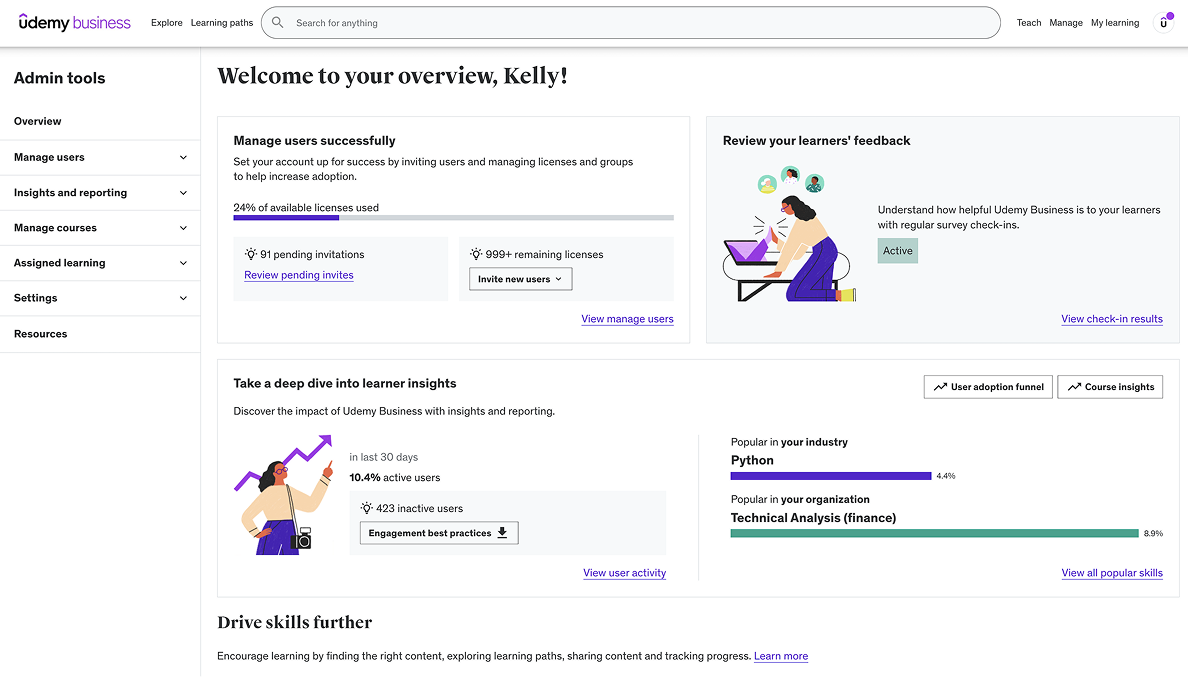
Udemy Business is a curated content marketplace with a huge variety of courses on virtually any topic.
These expert-led courses can be arranged into personalized learning paths based on information provided by users, enabling companies to align employees’ educational journeys with organizational goals. Additionally, the platform allows for creating and uploading original content, so you can add your own courses and include them in your employees’ learning paths.
Because of the platform’s nature, it works best when integrated with whichever LMS or LXP is used in an organization. Fortunately, the choice of available systems to integrate it with is huge, with iSpring Learn also being featured on the list.
Pricing: Tiered pricing plans, free trial available.
15. Continu
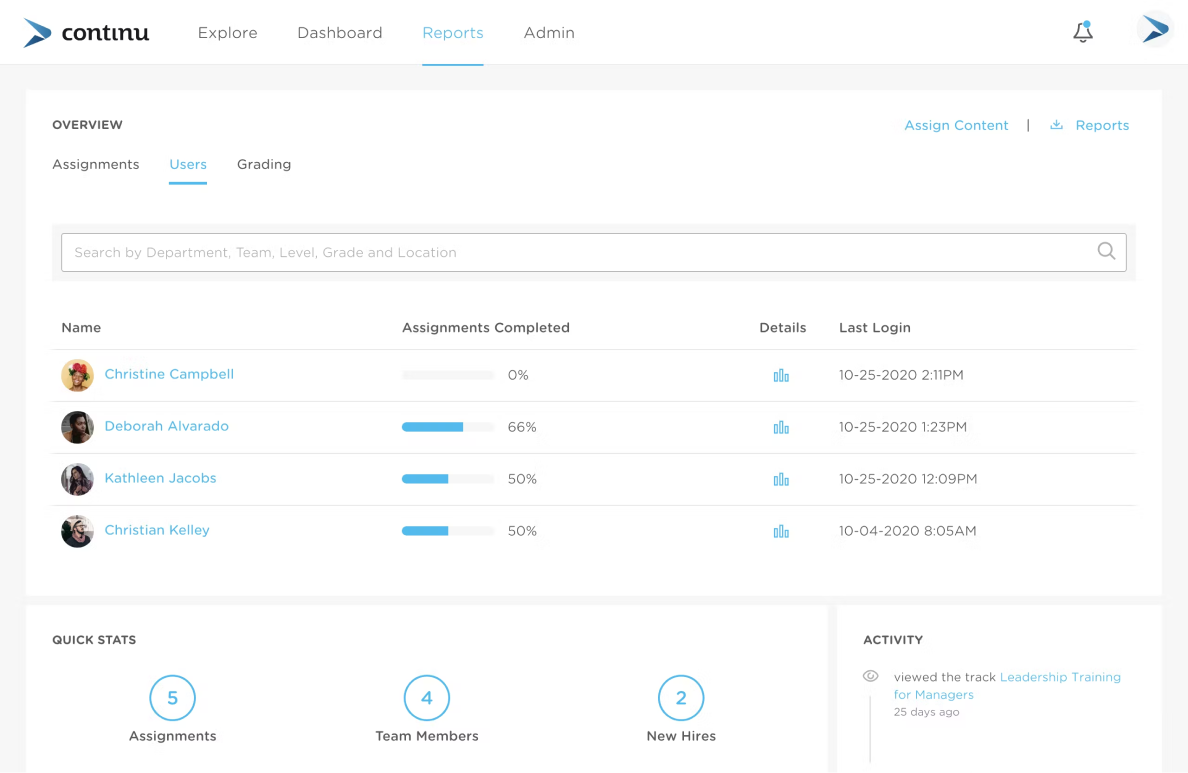
Continu is a robust learning and development platform that offers a blend of LMS and LXP capabilities. The solution boasts of being equally suitable for delivering standardized employee training programs to facilitate onboarding and compliance and custom-tailored learning experiences for more personalized training.
Some standout features include easy content production, AI-powered admin automation, seamless integration with various tools and learning content libraries like Coursera Business and LinkedIn Learning, and personalized learning recommendations. The platform’s Smart Segmentation feature is another way to build customized learning tracks by grouping employees with common characteristics.
However, navigation issues are not uncommon, according to reviews. Some reviewers also mention the lack of user-friendliness and a steep learning curve.
Pricing: Tiered pricing, details available upon request.
16. Axonify
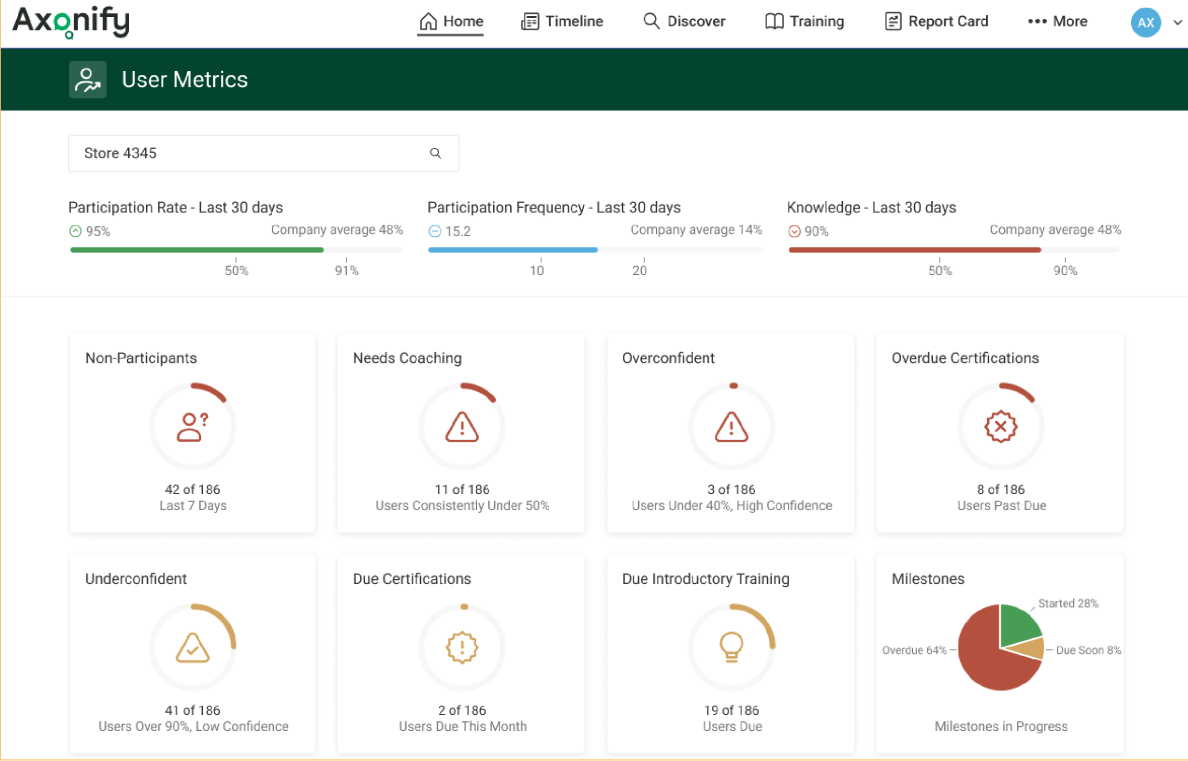
Axonify is a learning management system with a strong focus on microlearning, learner engagement, and closing skill gaps. While having some typical LMS functionality, it shines in making learning easy and fun — particularly, by offering easy-to-consume bite-sized content and leveraging gamification features.
Another emphasis is enhancing knowledge retention with the spaced repetition technique. Other notable features include communication and feedback capabilities, advanced task management that reduces admin workload, and reporting.
That said, you might find this platform lacking if you’re looking for something that’s more than a superior learner experience. Some issues mentioned in customer reviews include missing features, not enough customization in reports, and a confusing interface.
Pricing: Available upon request, no free trial.
17. Coursera for Business
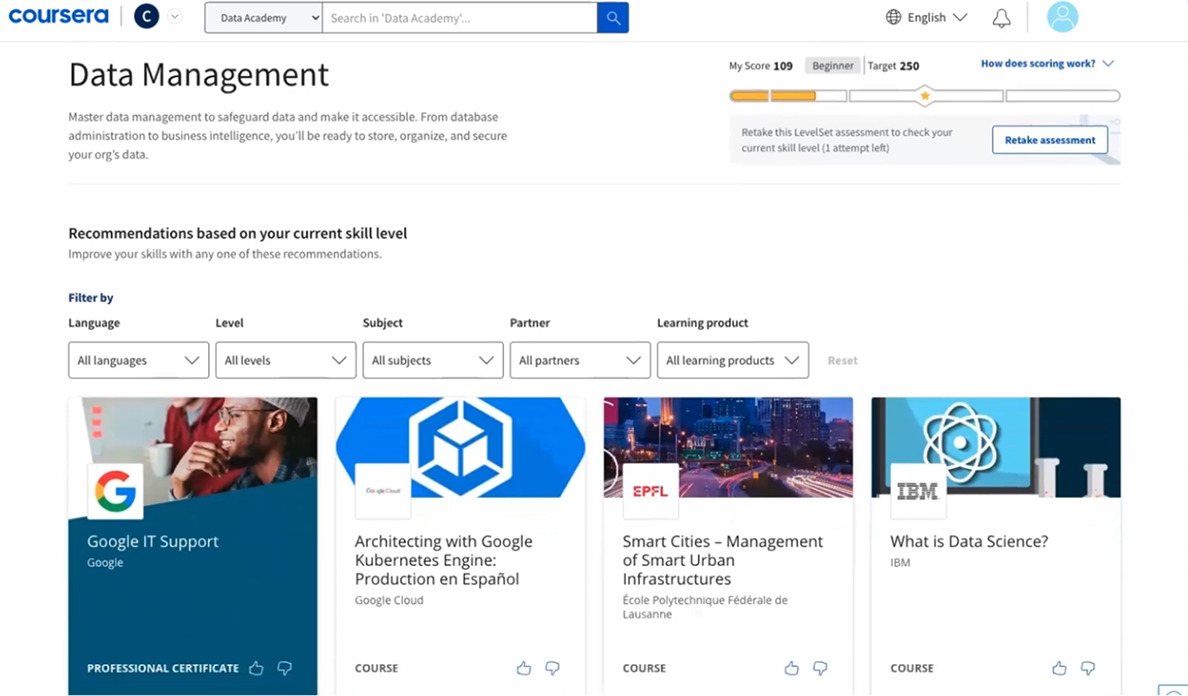
Coursera for Business is an easily implementable learning and development platform featuring thousands of educational courses on different topics. The content on the platform is provided by leading educational institutions and commercial enterprises, which ensures high quality and industry recognition.
Learners also get certificates they can showcase on their resumes, plus they can follow AI-customized learning pathways to build career-critical skills. With this platform, employees can learn at their own pace and discover relevant content by following smart recommendations.
However, as is the case with other similar platforms, Coursera for Business might not be fully sufficient as a standalone eLearning solution. That’s why it is most often used as an integration within a more functional LMS or LXP, in order to compensate for the relative lack of features.
Pricing: Various pricing options. Subscription plans start at $59.00 USD per month (if billed monthly).
18. GoSkills
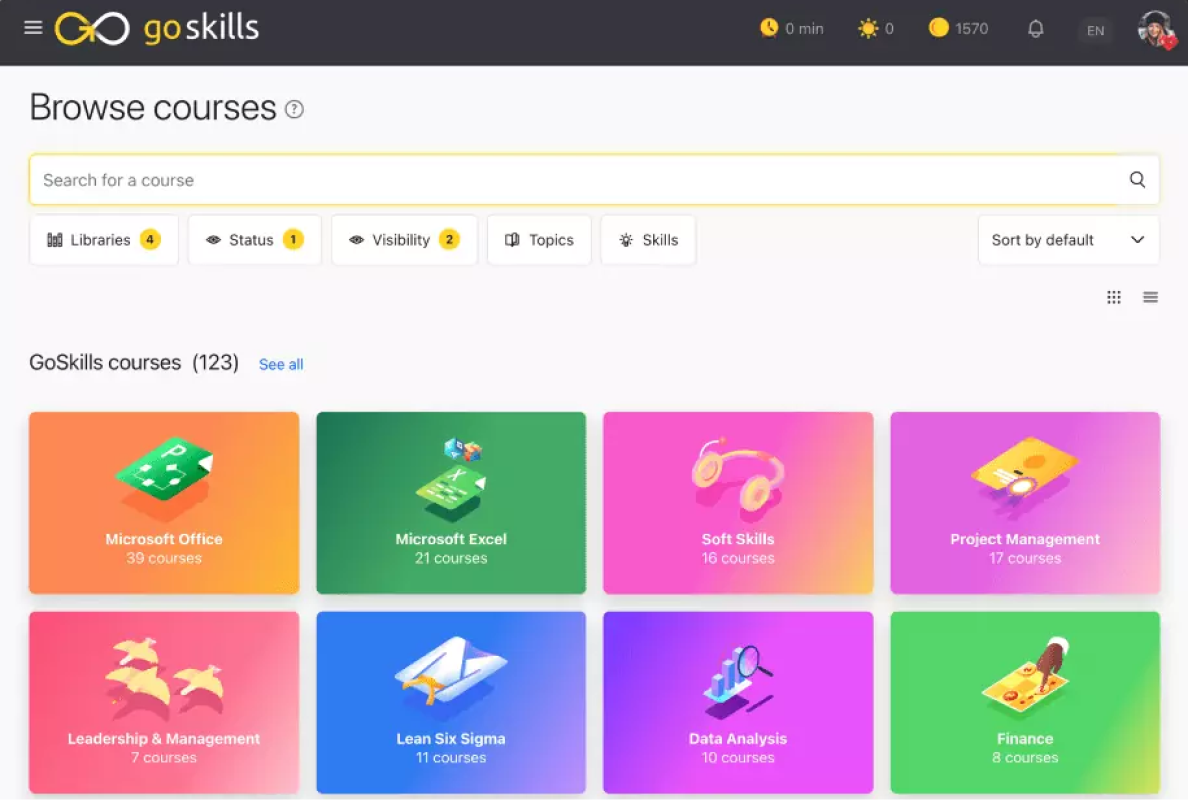
GoSkills is a user-friendly LXP with some LMS features and a strong focus on content quality and learner engagement that’s mainly targeted at small and mid-sized companies.
The platform’s key features include an intuitive course builder, a ready-made course library with expert-led bite-sized content, a customizable templates gallery, analytics and engagement tools, and a variety of integrations available through API. The emphasis on learner engagement makes workplace learning, as well as personal learning and development with GoSkills, more enjoyable and enables employees to acquire and hone relevant skills more efficiently.
Among the cons cited in the reviews, the most common include a relatively small variety of courses.
Pricing: Tiered pricing plans include a forever free plan with limited functionality.
19. Canvas
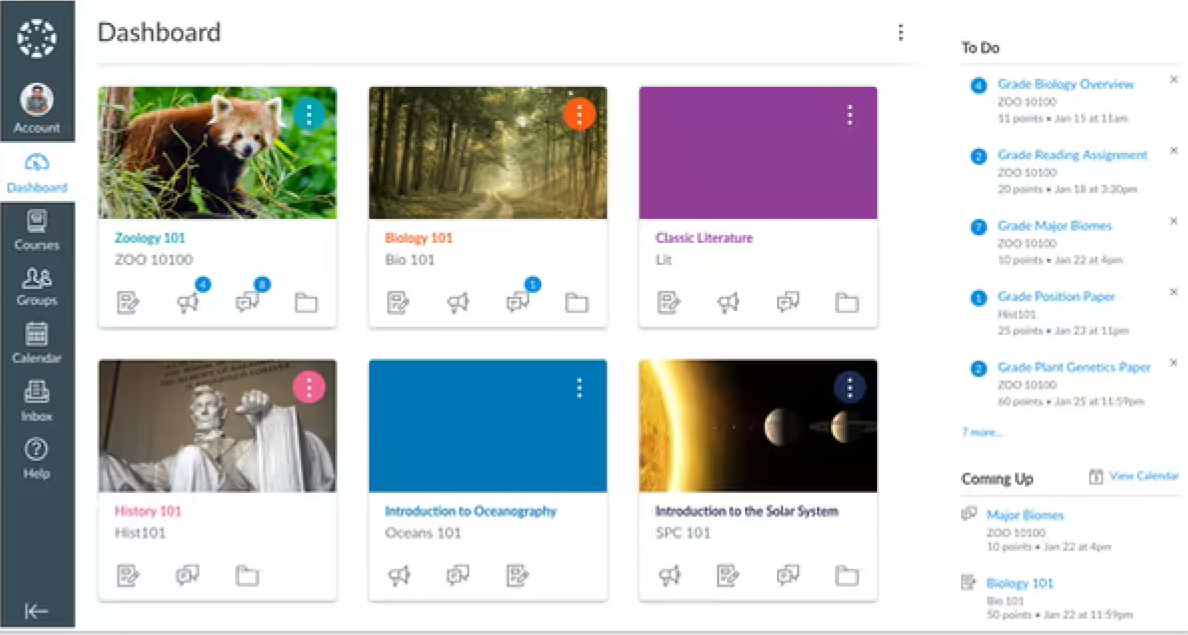
Canvas is widely used by educational institutions of all sizes, from K-12 to colleges and universities, and is mainly praised for its intuitive, user-friendly interface.
Being an LMS at its core, Canvas nevertheless offers an abundance of features typical of LXPs, including social learning and gamification, interactive analytics, and more. The platform’s customizable dashboard is another standout feature that users find very convenient, and many integrations will come in handy for those who want even more functionality.
On the downside, some find Canvas’ pricing too high. Its ample capabilities can also sometimes be a drawback, resulting in a steeper learning curve.
Pricing: Upon request, a Free-For-Teacher account with limited features.
20. TalentLMS
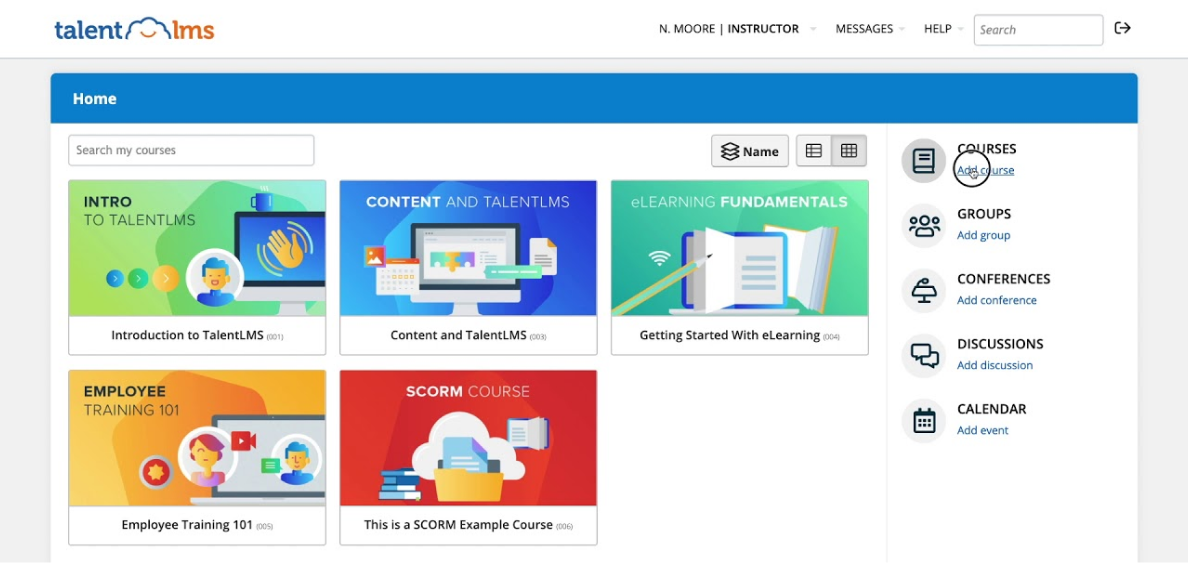
TalentLMS is best known as a learning management system for small businesses. Yet, like many modern LMSs, it incorporates a considerable number of LXP features that make it a decent substitute for a full-fledged learning experience platform in some cases.
The most notable LXP features offered by this platform include an intuitive interface, extensive gamification, and some communication tools. You can also create learning branches, customize learning tracks, and more.
On the flip side, reviews mention limited functionality and challenges with integrations. As integrations go, the choice is somewhat limited, but more can be added via API.
Pricing: Tiered pricing starts at $109.00 USD per month (if billed annually).
How to Choose the Right LXP: Key Factors to Consider
From functionality and pricing to the vendor’s track record, here are the crucial factors to consider when choosing a learning experience platform for your company.
1. Superior learner experience
User-friendly interface
The user interface (UI) should be intuitive to remove friction when interacting with the platform. Superfluous elements, outdated design, illogical structure, etc., can all discourage students from learning with the platform before they even start, so this element is crucial for a good LXP.
Support for microlearning
Microlearning is an effective approach that lets you keep learners engaged without overwhelming them with too much information. Look for an LXP that allows for the creation of microlearning content like short videos and infographics, as well as for structuring and delivering it effectively.
Mobile-friendliness
Fitting learning sessions into a packed schedule is always a challenge, and mobile learning is an effective way to overcome it. That’s why the best modern LXPs, as well as LMSs, offer native mobile apps that integrate seamlessly with the vendor’s web-based or on-premise desktop solutions, enabling students to learn from anywhere they choose to.
Gamification
Statistics indicate that games are not just for kids. When integrated into the learning process correctly, gamification also helps adults stay engaged and have better learning outcomes. Elements such as levels, scores in quizzes, badges, and leaderboards all come in handy when you need to bolster students’ motivation and add an element of competition.
Social learning features
Social learning is an adult learning theory established in the late 1970s. Modern learning platforms help to put this theory into practice by offering features such as discussion forums, clubs and communities, social feeds, and more. For LXPs, social learning features are among the most essential since they support more engaging, interactive learning experiences.
2. Advanced personalization
Adaptive learning
Asynchronous learning, especially without additional support from tutors, can often be unengaging and generic because of the one-size-fits-all approach and limited technical capabilities of the learning platform.
Adaptive learning tackles the issue by analyzing each student’s performance, activities, assessment results, and other data with AI algorithms and offering the most relevant learning materials. This results in greater engagement and better learning outcomes.
Personalized learning paths
Learning paths, or learning tracks, are a series of courses arranged in a logical, consequential order. This approach helps make learning more comprehensive and avoids possible knowledge gaps.
Modern learning experience platforms leverage AI to automatically create customized learning paths based on learners’ career goals, needs, and current skills. This feature lifts personalization to a whole new level while also freeing up instructors’ time for other tasks.
3. Built-in library with ready-made courses
Expert-led courses

A built-in course library worth having should feature materials from trustworthy experts — preferably those who are well-known in their fields and have easily verifiable credentials. This way, you can be sure your employees learn from the best and don’t waste their time consuming learning content that is useless at best.
Content type and topic variety
Another essential aspect to consider regarding built-in courses is the variety of topics and available content formats. To ensure all bases are covered, look for platforms offering learning content on a selection of topics relevant to your entire workforce and not just a single department.
Accreditations and certifications
The best LXP libraries offer courses that are not just high-quality but also accredited by trustworthy organizations — colleges, universities, and big enterprises.
These accreditations ensure that the course content is truly valuable but also that the learning content is up to the institution’s standards. In a best-case scenario, the platform will also award certificates to learners upon successful course completion.
Convenient course administration
Administration tools are essential for effectively managing the courses offered by the platform. A convenient and intuitive admin dashboard will save tons of instructors’ time, and automation features will further streamline tedious administrative routines, such as enrollments, progress tracking, and reporting.
Native AI-powered authoring tool
Having built-in courses at your fingertips is great, but most companies will want to add original learning content to the mix. A convenient authoring tool is indispensable for organizations designing their own courses, but an AI-assisted authoring tool is a real game-changer.
For example, iSpring Learn comes bundled with iSpring Suite Max — a comprehensive course creation solution that combines the power of a cloud-based AI-enhanced tool with the familiarity and convenience of MS PowerPoint.
Multimedia content and templates library

As mentioned earlier, content type variety is essential for catering to different learning styles. Course templates further facilitate the course creation process, allowing you to fill in the blanks with original content and make minor adjustments when necessary instead of designing an entire course from scratch.
4. Social learning and community support
Engaged community
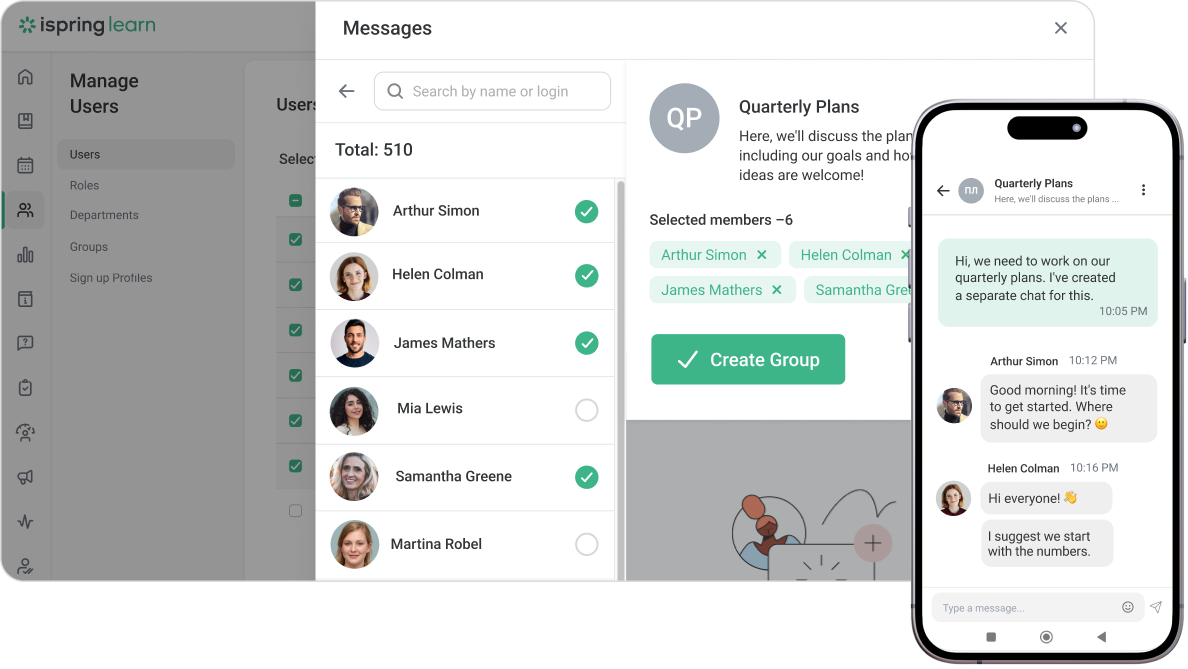
The social learning functionality of an LXP connects employees regardless of their location and schedules, allowing them to build a strong community where people share ideas and insights, connect in meaningful ways, learn from each other, and strive to excel. This is a win-win approach: each employee, the team, and the entire organization stand to gain.
Consistent support
A social learning platform always puts community support front and center. LXP functionalities like message boards and forums allow learners to reach out to colleagues and instructors instantly and get answers and assistance without delay.
User-generated content (UGC)
One of the benefits of LXPs, as compared to other learning platforms, lies in their support of UGC. When students or employees create and share their training materials and courses, they feel more valuable because they can actively contribute to the community.
5. Scaling potential and pricing options
Scaling potential
A scalable platform should be able to handle a heavy workload without reducing its performance. This is usually achieved by utilizing cloud-based infrastructure and modular design, efficient user and content management, performance optimization, and integration capabilities.
Long-term costs and support options
Just like LMS pricing, LXP pricing is rarely straightforward and often includes additional expenses. To ensure that the platform won’t strain your budget, calculate long-term costs in advance, taking your growth forecasts into consideration.
Free version availability
No matter how much research you do, it will not give you as much insight as a test-drive of the product. That’s why some LXP vendors offer free trial versions of their platforms.
Functionality will typically be limited during these test-drives, but it will be sufficient to get the feel of the software.
iSpring Learn offers a free 30-day trial that you can start by filling in a simple form — and you won’t even have to provide credit card details.
6. Integration with existing systems
Ease of implementation
The implementation process is an important factor that affects the LXP’s integration with software currently in use in a company. Clear documentation, a straightforward installation process, and consistent support from the vendor are the factors that ensure the implementation will go as smoothly as possible.
API/third-party integrations
The best LXPs offer a wide range of native integrations. However, as part of an IT ecosystem of a given organization, a learning experience or learning management platform usually also needs integration with various third-party software.
Automatic provisioning
Automatic provisioning greatly facilitates user management in an organization’s ecosystem, saving admin time on routine tasks and ensuring that employees get access to the learning platform promptly.
Support for eLearning standards
Currently, there are five eLearning standards in the industry, including SCORM, which is probably the most common and well-known, and xAPI, which is considered the most versatile and is utilized in many LXPs.
7. Ability to evaluate learner experience
Dashboards with key metrics
The easiest way to quickly assess learners’ engagement, performance, and results is to monitor a few relevant metrics. These include engagement and course completion rates, assessment scores, and time spent to complete each specific task (time on task).
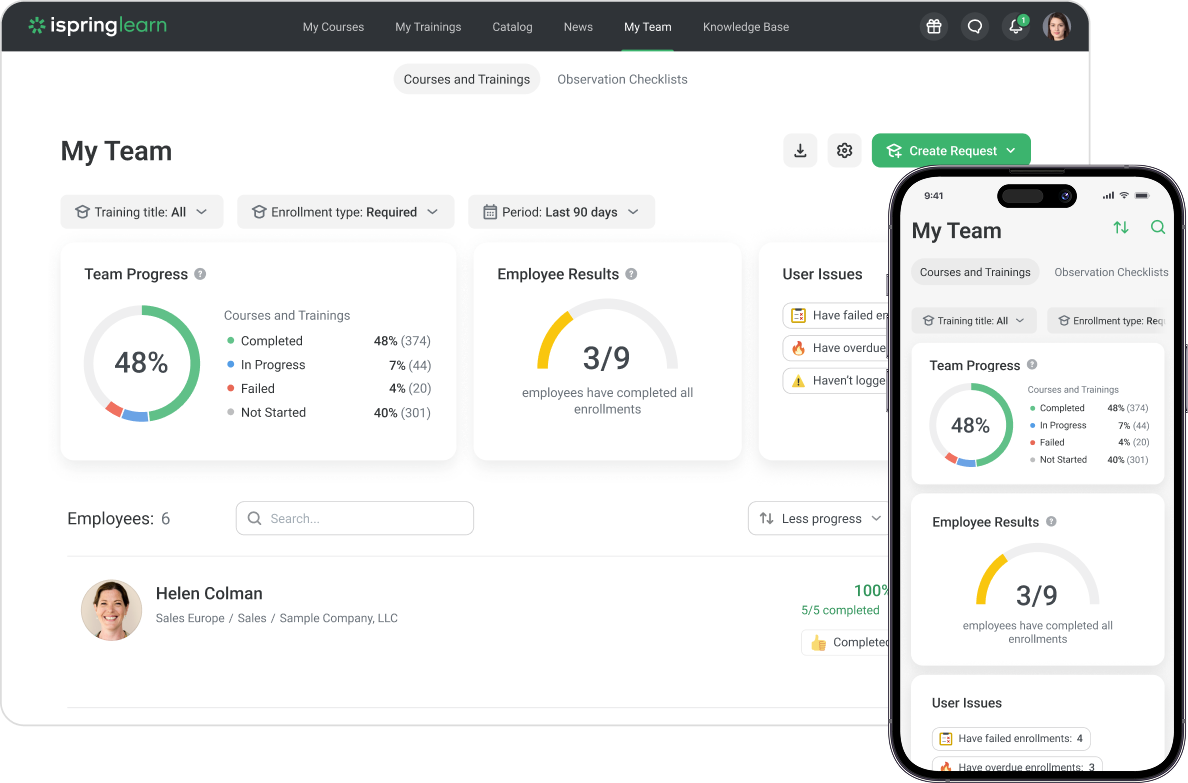
Targeted reporting
Targeted reporting is a feature that allows for the generation of reports focused on specific aspects, such as learner segments or pre-defined metrics. Such reports provide deeper insights into the learning process and help L&D specialists make more informed strategic decisions.
Assessment and feedback tools
Features like interactive assessment tests and quizzes are an effective way to quickly track learner progress and evaluate students’ knowledge on a specific topic. More comprehensive features, such as performance appraisal tools, provide deeper insights into each learner’s strong and weak points, helping to identify areas for growth.
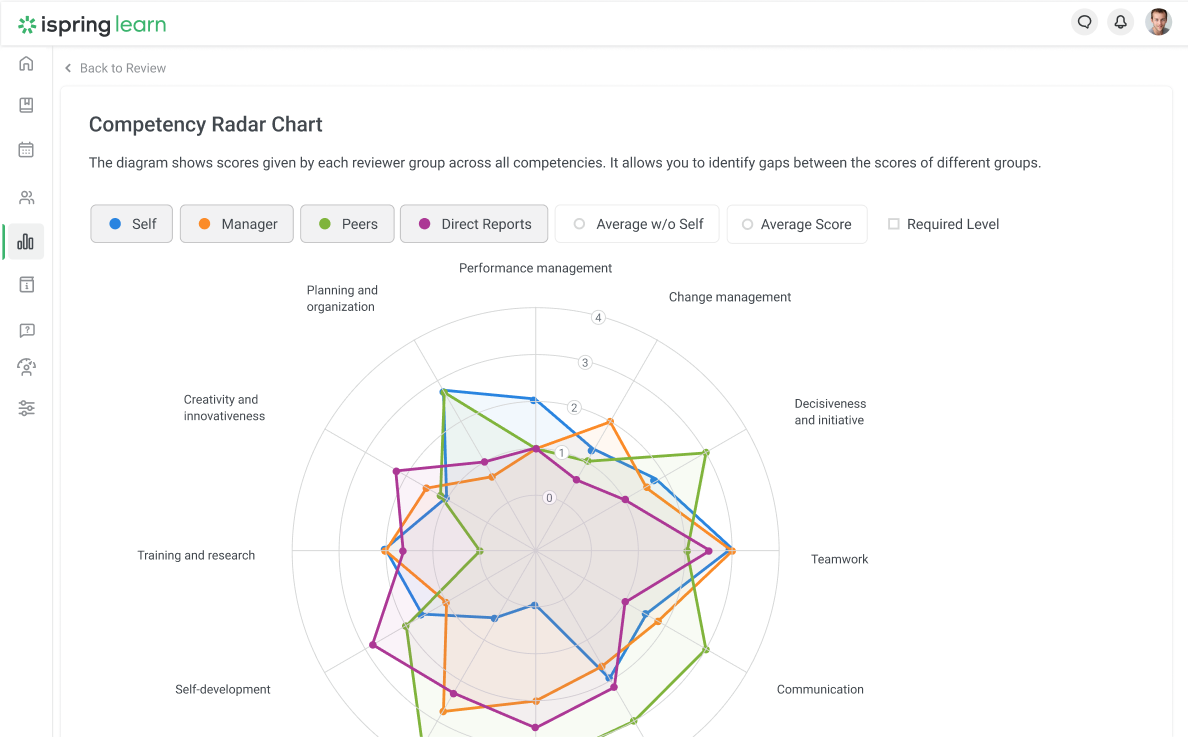
Also, modern educational platforms often feature virtual AI assistants capable of providing instant feedback and answering questions in real time. Another effective way to deliver feedback is instructor-to-student and peer-to-peer assessment enabled by discussion forums and chats.
8. The vendor’s track record
Years on the market
Although startups can offer good products, years in business still matter a lot, especially for online learning platform vendors.
Companies like iSpring that have been in the market for decades have had enough time to tap into their clients’ needs and refine their products, making them exceptional.
Industry recognition
eLearning is a big industry that has its experts, expert organizations, and awards. The best online platforms that are well-established on the market regularly receive these awards, which serve as recognition of their high quality and status. One is Brandon Hall’s Excellence in L&D Technology Award, which iSpring is proud to have received not once, but a full eleven times over the years.
Customer reviews
Customer reviews have a huge impact, affecting purchasing decisions for every product group, including software. The prevalence of positive reviews of a certain LXP or vendor on popular websites like G2, Capterra, and TrustPilot is a sure sign of high customer satisfaction and an indication that the platform is very likely a safe choice.
Summing Up
In this article, we’ve explained what a learning experience platform (LXP) is and how it differs from another common type of online learning platform — a learning management system (LMS). We’ve also compared the two platform types and reviewed the top 20 learning experience platforms currently available.
Finally, we provided guidelines on how to choose the right LXP, pointed out the key factors to consider, and mentioned some of the most common challenges in LXP implementation.
If you’re looking for a reliable eLearning platform with robust functionality that combines the best features of LXPs and LMSs, iSpring Learn could be the optimal choice. Try it out for free to see if it fits.



